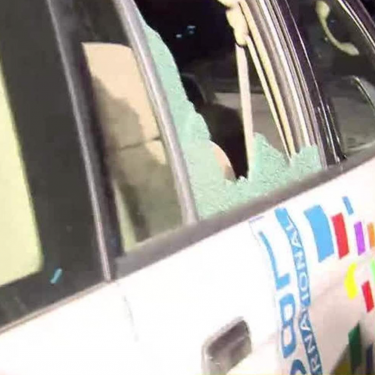After grenade attack on TV station in Lebanon, concerns about a return to violence against media

Reporters Without Borders (RSF) calls for a thorough and independent investigation into a grenade attack on a Lebanese TV channel after it broadcast a satirical sketch that elicited threats. Those responsible must be identified, says RSF, condemning the attack and voicing concern about the return of violence aimed at silencing media outlets in Lebanon.
The grenade exploded in the parking lot of the studios of Lebanese Broadcasting Corporation International (LBCI) in Adma, 26 km north of Beirut, on the evening of 22 January, interrupting a live broadcast by journalist Bassam Abou Zeid, who was visibly surprised by the noise of the blast.
The explosion damaged cars in the parking lot and one of the building’s walls but caused no injuries. Two so far unidentified individuals on a motorcycle are suspected of having thrown the grenade, according to an initial police investigation. One of Lebanon’s most popular and respected TV channels, LBCI said after the attack: “We will always be a platform for freedom and in defense of Lebanon.”
“Political threats leading to violence against a media outlet have become common in Lebanon but this grenade explosion at LBCI’s studios constitutes a major escalation. This is an attempt to terrorise journalists, satirists and those who work with them. We insist that the Lebanese authorities carry out a full investigation that makes no concessions, in order to identify those responsible for this attack and the preceding threats, and bring them to justice.”
The attack followed a controversy about a satirical sketch entitled “Learn to speak Shiite” that was broadcast on 19 January as part of a show entitled Ta’a Ello Byez’al by comedians Hussein Kaouk and Mohamed Dayekh. It triggered a wave of criticism and threats on social media against the TV channel and the two comedians, especially from individuals and groups linked to Hezbollah.
Ahmad Kabalan, a Ja’fari Shia mufti close to Hezbollah, condemned the programme two days before the explosion, saying that “sectarian media are more dangerous for Lebanon than a nuclear bomb.” He also told the Lebanese media, especially LBCI’s management: “Fire is smouldering in the country. I ask the management not to throw oil on this fire.”
In response to the criticism and threats, including death threats, the two comedians released a video in an attempt to defuse the situation.
This is the third armed attack against a TV channel in connection with a satirical sketch in less than a month, amid growing hostility towards freedom of expression in Lebanon. After Al-Jadeed TV broadcast a controversial sketch in December, a Molotov cocktail was thrown at its premises in the Beirut district of Moussaitbeh on the night of 26 December and a hail of shots were fired at it the following night.
Journalists have never stopped being subjected to intimidation and arrests in Lebanon, but the targeting of a media outlet with an explosive device recalls an earlier time in the country’s contemporary history when deadly violence was often deployed against journalists and media outlets in connection with their work, especially in 2005, when car bombs were used to kill two journalists, Samir Kassir and Gebran Tueini, and in an attempt to kill a third one, May Chidiac.
